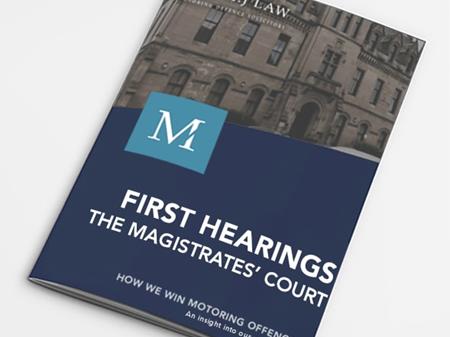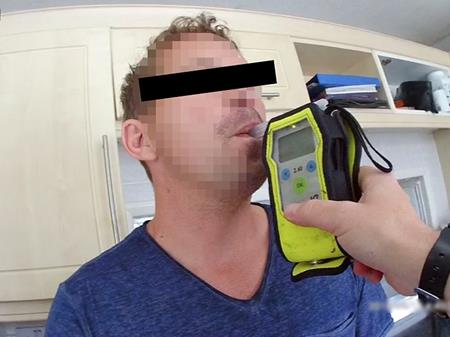Post Driving Consumption of Alcohol Defence
The ‘Hip Flask’ Defence - Post Driving Consumption
Our team of specialist solicitors have spent years fine-tuning post driving consumption defences to ensure that we give our clients the best chance of avoiding drink driving convictions. It is this attention to detail that has allowed us to develop into the country’s leading, family-run motoring defence practice.
What is the 'Hip Flask' Defence?
If you consume alcohol after driving a vehicle, and it was this amount that placed you over the prescribed limit, you can raise the ‘hip flask’ defence. If successful, you would not be convicted.
For those who do not wish to read the full booklet, we have summarised the most important aspects of the defence below. If you have been charged with drink driving, we would strongly advise that you contact our team of specialist solicitors, who will be able to outline your options and discuss a defence strategy unique to your case.
What you need to know
- Post Driving Consumption is a full statutory defence to an allegation of drink driving. If successful, the court will not convict you.
- The burden of proof falls on you to establish – on a balance of probabilities – that you consumed alcohol after driving and before the test. You must also show that it was this alcohol that placed you over the legal limit.
- You may need to instruct an expert witness to produce a BAC calculation (blood alcohol concentration). M.A.J. Law work closely with independent expert witnesses, toxicologists and forensic scientists who can provide evidence to strengthen your defence.
- You may not be charged straight away. Those who raise this defence will often be bailed back to the police station. This is a crucial period of time that needs to be properly considered.
- If the defence is not successful, we could enter a ‘basis of plea’, often resulting in a substantially reduced period of disqualification. To find out more about a ‘basis of plea’, please contact a member of our team.
The Law
Section 5(1)(a) of the Road Traffic Act 1988 states that it is an offence to drive a motor vehicle on a road or public place whilst over the prescribed alcohol limit.
The police are only entitled to rely on the evidential breath test results at the police station. The roadside result is non-evidential. But the police station breath test will often take place over an hour after your arrest. This means that the level of alcohol in your body at the time of your test is unlikely to be the same as it was when you drove the vehicle, it may even be higher. So how do the police prove that you were over the limit at the time your drove?
Section 15 of the Road Traffic Offenders Act 1988 creates a legal presumption that the level of alcohol found in the evidential sample at the police station was the same as it was at the time of driving. In other words, the police don’t have to prove that the level of alcohol in your body exceeded the prescribed limit at the time you drove, only that it exceeded the prescribed limit at the time of the evidential test!
This sounds extremely unfair, but prevents the police having to conduct a BAC calculation in every case to try and determine the exact level of alcohol at the time of driving, as this would be time-consuming and extremely expensive!
However, this statutory presumption will not apply if the accused can prove:
- that he consumed alcohol after he had ceased to drive, and;
- that had he not done so the proportion of alcohol in his breath would not have exceeded the prescribed limit
- that he consumed alcohol before he provided the specimen
This part of the test is factual. It is for the defendant to establish, on a balance of probabilities, that he consumed alcohol after driving but before the evidential test. The most common scenario is where the defendant consumes alcohol in an attempt to calm his nerves following a road traffic collision – but there is no restriction or criteria for this defence. Providing we can present a convincing and plausible explanation as to why alcohol was consumed, this test should not cause too much difficulty.
- that had he not done so the proportion of alcohol in his breath, blood or urine would not have exceeded the prescribed limit
This part of the test usually involves expert evidence. The courts have decided that the burden of proof is on the defendant to prove that the post-driving consumption of alcohol had been responsible for placing him over the limit.
M.A.J. Law work closely with expert witnesses and forensic toxicologists who are authorised to produce reports for use in court. The purpose of the report is to determine whether the defendant’s breath test results are consistent with the recollected alcohol intake. It is not enough to prove that you would have been under the legal limit at the time you drove, you must also prove that the breath result was consistent with the entire alcohol intake.
Have you been bailed back to the police station?
There is a tendency for people on police bail to wait and see if they’ll be charged by the police before instructing a solicitor. This is never advisable because the police can bail you to court as soon as they’ve decided to charge you. In some cases – the following day. This leaves little time to prepare for the hearing or identify the potential defence strategy. M.A.J. Law offer a ‘stand-by’ service, allowing us to act on a provisional basis and ensure that we’re fully prepared if the worst does happen
The MGDDD document – Technical Defence Enquiry
The most common reason for police bail in ‘hip flask’ cases is to give the police an opportunity to conduct a back calculation. As mentioned previously, the legal presumption (that the level of alcohol in your breath was the same as it was when you drove) will not apply if the defendant can prove post driving consumption. Providing you actually told the police that you had drank alcohol after driving, an MGDDD document should have been completed with you, usually in an interview. This booklet aims to document your entire food and drink intake over the 24 hours leading up to the test. You will know if the police carried out this procedure because they will have asked you for your weight, age and height etc… (the police may even have scales in the interview room!). This information is then handed to an expert who will produce a BAC calculation report. If the report is favourable (in that it supports your alcohol consumption account), the police may be persuaded not to charge you (but in most cases will do anyway). If the report is unfavourable, the police will charge you.
When challenging the results provided by a prosecution expert, M.A.J. Law will need to consider the exact method of calculation, as well as the figures used to calculate. A prosecution expert will never give an exact figure or result, they often use ranges (as they appreciate that body types and elimination rates vary). If the range used by the expert also falls under the legal limit, we have a very strong argument that the case should fail.






